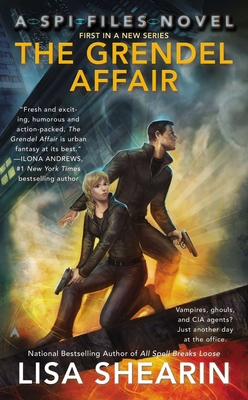The Hardest Part: Lisa Shearin on The Grendel Affair
← Coming to Town: Wendy Webb for The Vanishing, interviewed by Richard DanskyFeburary newsletter: Wendy Webb, Sheila Turnage, Deborah Johnson, Alice Hoffman, Megan Shepherd, MystiCon, TV deals, new and forthcoming books, literary lineups, and more →
The Hardest Part: Lisa Shearin on The Grendel Affair
Posted on 2014-01-30 at 3:9 by montsamu
I first met Lisa Shearin at a 5-author science fiction and fantasy panel at the Cary Barnes & Noble in 2010, hearing about her Raine Benares adventure fantasy series and feeling a bit overwhelmed — here’s an Ace-published author with 4 (at that time, since the series has grown to 6) books and I had a lot of catching up to do. But now Shearin has started a new series with the release of The Grendel Affair, the first book in her SPI Files series, giving old fans a new adventure to begin and new fans an obvious place to start, with a no-nonsense Southern urban fantasy heroine new on the job of protecting humanity from supernatural threats in New York City. I had the opportunity to talk with her on Carolina Book Beat earlier this month, and one thing we didn’t quite get to was the sentence-to-sentence, page-to-page work of writing a novel. Here, Shearin writes about the hardest part of her writing process: filling those blank pages.

The Hardest Part: First drafts (because you can’t fix a blank page)
By Lisa Shearin:
Unlike many writers, I prefer the rewriting/editing part of writing a book. For me, the first draft is the necessary evil that I have to get through to reach the part I really enjoy. Once I have the entire story down in rough draft form, that’s when I can start to play and have fun; because at that point, I’ve at least got something to work with.
For me, my ideal writing goal is 1,500 words a day. With chapter lengths of approximately 4,000 words, that’s about three chapters a week, right? Uh, not usually. Fifteen hundred words a day is when I’m really cranking out the words, inspiration is flowing, my muse is in the room (and cooperative). One thousand words a day more often what happens (because I still have a day job). But what about the times when the words aren’t flowing, when I really don’t know what happens next?
I write something, because nobody can fix a blank page.
I’ve recently finished writing my seventh book, and I’ve finally realized that it’s easier for me to face a blank page of paper than a blinking cursor in an empty Word document. I used to think it was because a blank computer page was simply more intimidating than a blank journal page. That may be true, but the words just seem to flow easier from my brain to a fountain pen to a blank page. There’s more of a visceral connection. As a result, I now save myself a lot of blank-page angst and write the first draft of each chapter in longhand. I give myself permission to write something, anything.
I explore my plot and characters on the page, to talk to myself on the page and work out ideas, and even to write what I know to be crap that I’ll be tossing in the literal or electronic trash can later. Because I can’t fix something that ain’t there. For those of you who (like me) shoveled cow manure into the dirt of the family garden when you were kids—you know that it takes a lot of crap to grow a good garden.
Nobody gets it right the first time; and heck, sometimes not even the second or third time. For me, first drafts are about just getting the story down. The second draft is for bringing it to life. The details, the nuances, digging deep for the sub-plots and motivations that didn’t (and couldn’t) make themselves known to me until I had the entire story down.
Unless you’re blessed, lucky, or unbelievably skilled, your first draft is going to be what we southerners call “butt ugly.” Mine are, and I’ve accepted that. There’s the struggle to get what’s in my head onto the paper and then to the screen. But mainly my problem is that I’m still working out the guts of the story while I’m writing it. I know the beginning, some scenes scattered throughout the book, and I know the ending. The trick is to come up with the elements that link all of those together—to create the story.
Writing, weaving a story, creating a world that’s never existed before, is fun—at least it should be. So give yourself permission to play.
The Grendel Affair is out now in paperback and ebook from Ace. Find out more about Lisa Shearin and her books at her website, lisashearin.com.
